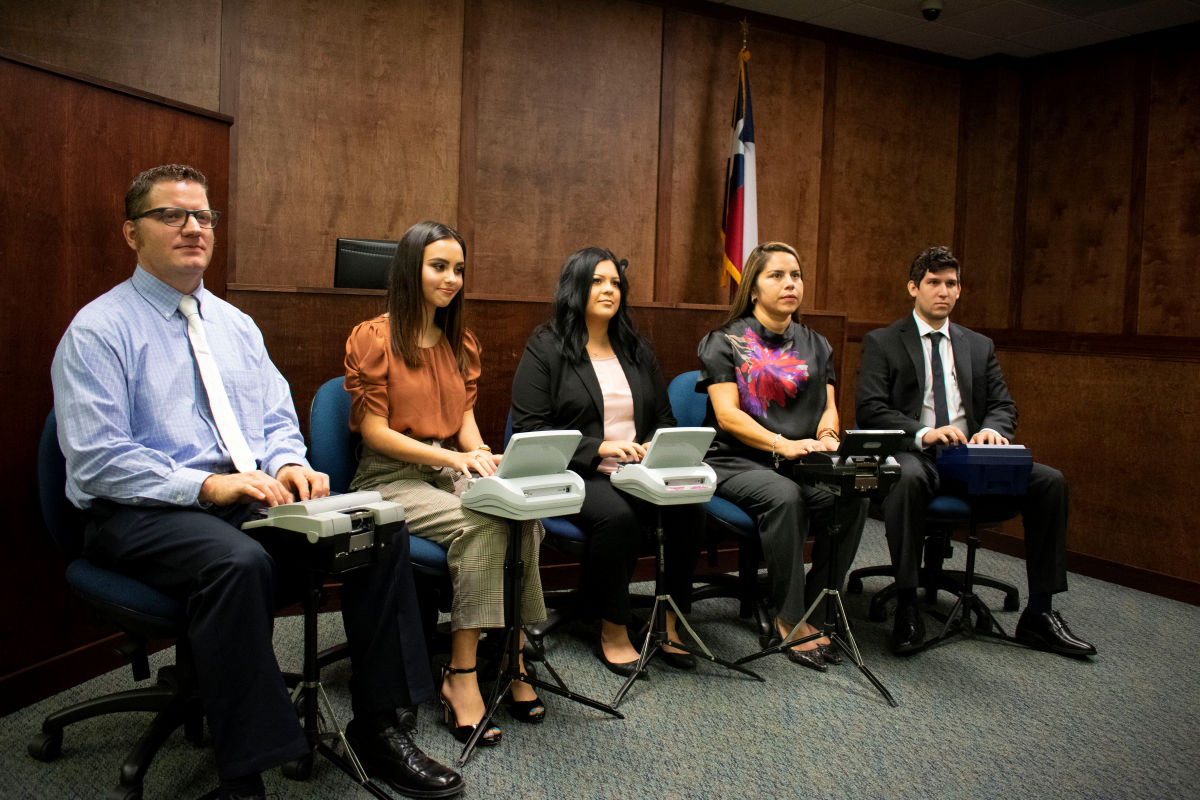Why durham court reporting is critical for accurate deposition transcripts
Wiki Article
Recognizing Court Reporting: A Summary of Its Duty in the Lawful Process
Court reporting is an important part of the lawful system. It ensures that every talked word during depositions and trials is accurately transcribed. This transcription gives a reliable document for future recommendation. Stenotype reporter possess specialized abilities and have to browse various innovations. durham court reporting. As the legal landscape develops, so as well does the duty of these experts. Recognizing their influence elevates important inquiries concerning the future of lawful documentation and accountabilityThe Importance of Accurate Transcription in Legal Procedures

Accurate transcription plays a necessary function in legal procedures, working as the structure for justice and liability. Court reporters, charged with recording talked dialogue throughout tests and depositions, guarantee that every word is recorded with accuracy. This transcription becomes a crucial record, allowing lawyers, courts, and judges to review the procedures properly. Mistakes or omissions in transcription can bring about misunderstandings, false impressions, and possibly unjustified outcomes.
These transcripts serve as official records that can be referenced in future lawful actions, allures, or academic evaluations. The honesty of the judicial process counts heavily on the dependability of these documents. The ability to present a clear, verbatim account of testaments and disagreements is vital in maintaining the policy of regulation. Subsequently, the significance of precise transcription can not be overemphasized; it is crucial for assuring reasonable tests and maintaining public rely on the lawful system.
The Abilities and Certifications of Court Reporters
While the function of a court press reporter is necessary in the legal system, it needs a distinct set of skills and qualifications to ensure reliable performance. Effectiveness in shorthand or voice writing is necessary, enabling press reporters to catch talked language properly and successfully. In addition, a strong grip of legal terms and treatments is essential, as court press reporters need to understand complicated discussions that happen throughout trials and hearings.Interest to information and remarkable listening skills are necessary to guarantee accurate transcripts - durham court reporting. Several court press reporters have qualification from recognized programs, which usually include strenuous training in transcription strategies and lawful principles. Strong interpersonal skills additionally play a substantial role, as press reporters regularly communicate with attorneys, witnesses, and judges. Inevitably, the mix of technological efficiency, lawful knowledge, and interpersonal capacities furnishes court reporters to satisfy their responsibilities properly within the judicial system
Different Kinds Of Court Reporting Solutions
Court reporting solutions include a range of specialized features customized to fulfill the requirements of the lawful system. One famous type is deposition reporting, where court press reporters record witness testimonies outside of court setups, typically for use in trials. Another service is real-time reporting, which offers immediate transcription during process, enabling lawyers to gain access to online message feeds. Furthermore, some court press reporters provide transcription of audio and video recordings, guaranteeing exact paperwork of occasions.Closed captioning solutions are additionally offered, decriminalizing proceedings easily accessible to individuals with hearing disabilities. Lots of court reporting firms specialize in offering particular legal fields, such as family regulation, criminal legislation, or corporate law, thereby providing tailored competence. Finally, some press reporters might give video deposition services, which enhance the documents process via visual context. Each sort of service plays a necessary function in making certain the accuracy and honesty of legal documents.
The Technology Behind Modern Court Reporting
Modern court reporting relies heavily on innovative innovation to boost precision and performance. Stenography machines, electronic recording strategies, and real-time transcription software are indispensable components of this field. These devices not just promote the transcription process yet additionally guarantee that lawful procedures are documented with precision.Stenography Machines Explained
Stenography devices offer as the foundation of contemporary court reporting, transforming talked words right into created text with remarkable effectiveness. These specialized tools make use of an unique keyboard design that allows stenotype reporter to type syllables and words phonetically, enabling them to catch discussion at high rates. Using shorthand symbols means that press reporters can record discussions in real time, making certain exact records of legal procedures. Stenography devices are geared up with innovative technology, consisting of software that can translate stenographic notes right into understandable message. This assimilation of software and hardware substantially boosts the rate and precision of court reporting, making it a vital tool in the lawful field. Therefore, stenography stays an essential skill for experts in the court room.Digital Recording Techniques
Advancements in her comment is here innovation have broadened the devices available for court reporting beyond typical stenography makers. Digital videotaping strategies have become a trustworthy option, recording audio and video of legal proceedings with high integrity. These systems use microphones and tape-recording devices strategically put to assure clearness and decrease background sound, providing a thorough record of testaments and discussions. The taped material can be repeated for precision during transcription, permitting stenotype reporter to validate details effectively. Additionally, electronic recordings can be saved firmly for future recommendation, enhancing accessibility and maintaining the integrity of the legal process. As courts accept these modern-day innovations, digital recording techniques play an increasingly critical duty in maintaining precise and efficient documentation.Real-Time Transcription Software Application
As courtrooms increasingly embrace technology to improve the lawful procedure, real-time transcription software program has actually come to be an essential tool for court press reporters. This innovative technology permits stenotype reporter to record talked dialogue quickly, giving immediate access to accurate documents throughout proceedings. By transforming talked words right into message as they are talked, real-time transcription software assists in reliable interaction in between attorneys, judges, and various other court individuals. The software typically incorporates with courtroom audio systems, guaranteeing that every word is captured with accuracy. Furthermore, it can produce transcripts for evaluation and distribution, improving the paperwork procedure. Because of this, real-time transcription software not just improves the effectiveness of court reporting yet additionally boosts the general accessibility of legal proceedings.
The Duty of Court Reporters in Keeping Courtroom Stability

Additionally, court press reporters add to the transparency of the judicial process. By providing extensive records, they enable the general public and media to accessibility court procedures, cultivating liability. Their existence in the court room also helps preserve etiquette, as their actions underscore the severity of the legal process.
Along with technological abilities, stenotype reporter useful content need to display expertise and impartiality, crucial for maintaining the stability of the judicial system. Inevitably, their attentive efforts support reasonable trial legal rights and strengthen public confidence in the lawful framework.
The Future of Court Reporting in an Evolving Legal Landscape
As the legal landscape advances, court reporting faces substantial changes driven by technical innovations and a growing change in the direction of remote services. These growths are improving just how court press reporters run, affecting both the rate and accuracy of legal documents. The future of this profession will likely depend upon its flexibility to these arising patterns.Technical Improvements Impacting Reporting
Numerous technical improvements are improving the landscape of court reporting, ushering in a brand-new era of performance and precision. Digital taping systems have ended up being commonplace, allowing for specific audio capture during procedures. These systems typically integrate with transcription software, facilitating faster turn-around times for transcripts. In addition, synthetic intelligence is playing a substantial function in enhancing the transcription process, with speech recognition innovation assisting reporters in generating much more exact documents. In addition, cloud-based storage solutions enhance availability, enabling lawyers to get and share records conveniently. As these advancements remain to develop, they promise to further change the court reporting occupation, improving the general legal procedure while keeping high standards of expertise and integrity.Shift Towards Remote Providers
The lawful landscape is significantly accepting remote services, improving see just how court reporting is conducted. This shift has actually been increased by technological innovations and the need for adaptability throughout recent international events. Stenotype reporter currently use video clip conferencing platforms to assist in hearings and depositions, permitting higher accessibility and performance. Remote services enable participation from numerous locations, lowering traveling prices and logistical difficulties. In addition, electronic transcription devices improve accuracy and enhance the documentation process. As the legal market adapts, stenotype reporter are called for to establish new abilities and familiarize themselves with arising innovations. This development provides both opportunities and challenges, pushing the career in the direction of an extra incorporated, technology-driven future while retaining its core commitment to delivering precise and reputable legal paperwork.
Regularly Asked Questions
Exactly How Much Do Court Reporters Typically Make Annually?
Stenotype reporter usually earn between $50,000 and $100,000 annually, depending upon experience, place, and the demand for services. Specialized qualifications or skills can additionally boost their gaining possibility in different legal setups.What Is the Average Period of Court Reporting Training Programs?
Court reporting training programs usually last in between 18 months to 2 years. This duration varies based upon the organization and the particular curriculum, including both theory and sensible skills crucial for aspiring court press reporters.Can Court Reporters Work From Another Location for Lawful Process?
Yes, court reporters can function remotely for lawful proceedings, making use of modern technology to transcribe audio and video clip feeds. This flexibility allows them to provide precise documentation while maintaining the stability of the legal process.What Is the Distinction In Between a Court Press Reporter and a Clerk?
A court press reporter specializes in recording legal procedures, while a clerk focuses on shorthand writing for numerous contexts, consisting of meetings and conferences. Both functions entail capturing talked words yet differ in their certain applications and environments.Are Court Reporters Required to Have Qualifications or Licenses?
Yes, stenotype reporter are generally required to get licenses or qualifications. These qualifications ensure they possess the necessary skills and understanding to precisely record lawful proceedings, maintaining the integrity of the judicial procedure.
Several court press reporters have certification from recognized programs, which often consist of extensive training in transcription strategies and lawful values. One prominent type is deposition reporting, where court press reporters transcribe witness statements outside of court setups, frequently for use in trials. As courtrooms significantly embrace technology to enhance the lawful process, real-time transcription software has come to be a vital device for court reporters. Yes, court reporters can work from another location for legal process, utilizing modern technology to record sound and video feeds. A court press reporter specializes in transcribing legal process, while a stenographer concentrates on shorthand writing for numerous contexts, including conferences and meetings.
Report this wiki page